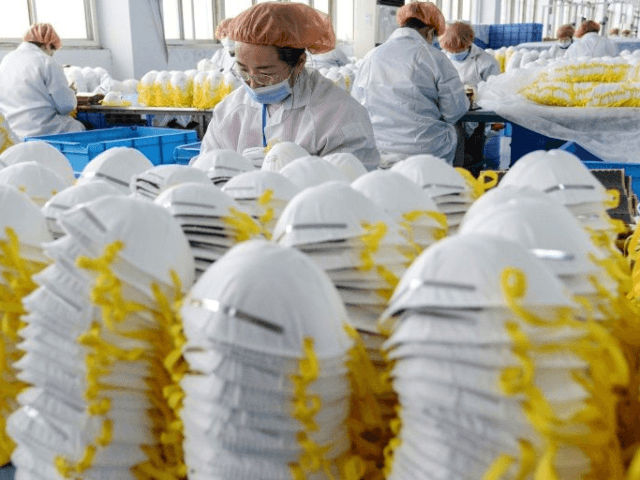Now that most international public health experts have reversed their curious positions from earlier this year that masks do nothing to slow the spread of the Wuhan virus, China has capitalized on the surging demand for masks to become the world’s biggest provider, despite persistent complaints from customers about the poor quality of Chinese products.
The South China Morning Post (SCMP) reported on Monday that so many Chinese companies are trying to switch to mask production that bidding wars have erupted for the good mask-making machinery, and the losers have decided to repurpose not-so-good machines to crank out masks at less expense.
One enterprising sock manufacturer shrugged that his modified mask machinery was capable of meeting a Chinese standard that is “close to N95,” the worldwide recommended standard for protection against the coronavirus, and that was good enough for him. The Chinese standard does not offer the same protection against airborne droplets that might carry the virus, but it is much easier and cheaper to meet because it does not require the same “clean room” manufacturing standards.
As the SCMP pointed out, a large number of the masks shipped by Chinese companies do not even meet the lower Chinese standard, and the Chinese Foreign Ministry is not interested in explaining why. The Chinese Communist Party (CCP) keeps promising more aggressive inspections and tighter export controls, blaming substandard and utterly useless products on black-market fraudsters who forge their certifications.
“Companies that used to produce lamps made some quick renovation to their workshops and started making masks. Do you think the quality is guaranteed?” one Chinese businessman sarcastically asked the SCMP.
As the report pointed out, China’s 20,000 mask producers and distributors now account for about half of the total mask production in the world, and some of those producers are enjoying thousand-percent gross profit margins. Skipping the accreditation process and forging credentials saves enterprising mask makers at least five months of effort and about $75,000 in upfront costs. Even after expanding production capacity, the more respectable Chinese mask making companies say they cannot meet demand.
The urge to cut corners and jump into the mask business as fast as possible is even stronger because the rest of China’s export economy is reportedly in very bad shape, as the Epoch Times chronicled on Monday:
As the outbreak of the CCP (Chinese Communist Party) virus, commonly known as novel coronavirus, became severe in January, much of China was placed under lockdown and factories stopped production for more than a month.
In February, Beijing encouraged companies to resume operations as it grew concerned about an economic slowdown. But Chinese companies were worried that the virus could spread among employees; many factories remained closed.
As some factories reopened in March, they realized they faced a bigger challenge—having no orders to fill.
Orders were canceled as the virus spread to other countries, which also adopted social distancing measures and reduced economic activity.
China’s exports have continually fallen since January. Reuters reported on April 13 the results of its survey with 31 Chinese economists, who estimated that China’s exports in March would be 14 percent lower compared to the previous year. That figure is a lesser downturn than the 17.2 percent contraction during the January-February period.
The survey also projected that China’s economic growth would slow to about 2.0 percent due to the pandemic, the lowest rate in over 40 years.
The report quoted some Chinese companies that said most or all of their foreign orders have been canceled, so they will not resume operations until late summer at the earliest. Some of them encouraged their employees to quit, collect severance benefits, and hope to be re-hired when and if the factories open again. Others flatly advised their staffers to look for new permanent jobs.
“No orders in the near future means more factories will close in China, and many people will lose their jobs. When lots of unemployed people don’t have money to pay their mortgages or to buy goods, China will suffer a bad financial crisis,” commentator Tang Jingyuan predicted.
Some analysts believe China will lose over 30 million jobs as a result of the coronavirus, due to both its effects on the domestic economy and the hardships it has inflicted on customers overseas. The lingering question is if some of those customers will turn away from Chinese providers forever, either because they decide to reclaim their supply chains or because they are fed up with low-quality products, disgusted by the Chinese Communist Party, and worried about the next pandemic it might unleash.
CNBC on Monday noted that many analysts thought the drop in Chinese exports would be even worse in March. The actual decline in exports for the month was 6.6 percent, but the most pessimistic projects anticipated 9 to 14 percent. China’s trade surplus with the United States fell from $25 billion to $15 billion in March, a collapse that could have been worse if a trade agreement had not been struck shortly before the coronavirus crisis erupted.
Economists quoted by CNBC said China’s economy could absorb anything less than a ten-percent reduction in exports without suffering significant long-term damage. The mask boom story suggests that China might have avoided that kind of damage, at least for the time being, because the rest of the world caught the coronavirus and was forced to shutter many of its own production lines. The CCP did everything it could to push the Wuhan virus out beyond China’s borders and thus avoided becoming “the sick man of Asia,” to quote the turn of phrase it apparently despises more than any other.

COMMENTS
Please let us know if you're having issues with commenting.